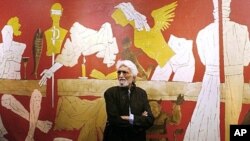India’s most eminent artist, Maqbool Fida Husain, has died in London at the age of 95.
Tributes flowed in from the India's President Pratibha Patil, Prime Minister Manmohan Singh, artists and ordinary citizens when news of Maqbool Fida Husain’s death in London was reported in India.
M.F. Husain was known as the “Picasso of India,” and his works sold for millions of dollars.
The artist, working on a sketch (Reuters).
His impact in India's world of art cannot be underestimated, said Neha Kirpal, founder of the Indian Art Fair, which organizes exhibitions of contemporary Indian art.
“For many decades now he’s been one of India’s most celebrated painters and also one of the artists who has put Indian art on the world map,” Kirpal added.
But the Muslim artist became embroiled in controversy after he painted nude Hindu deities, and depicted India as a nude woman.
Angry Hindu radial groups called the paintings an insult to their religion. They offered a reward for his death, vandalized some of his works on display at art galleries and slapped hundreds of legal cases against him.
In 2006, the artist finally left his Indian home to live in Dubai. Four years later he accepted Qatari citizenship.
Husain poses in front of one of his paintings in 2003 in Bangalore, India (AFP).
The artist refused to comment on the controversy, saying he remained deeply rooted to India, and was only living overseas to do his work.
He apologized for the paintings and told an Indian television interviewer that maybe his art had not been understood.
“I am in the idiom of modern art, contemporary that is very difficult to understand," he said. "There a figure or a woman I paint, though it nude, but that figure is not realistic.
Husain’s decision to give up his Indian citizenship triggered a huge debate in the country. Artists and many citizens said authorities should have done more to ensure that its most eminent painter could work without harassment in his homeland.
The government said it was willing to offer him protection. Neha Kirpal says it became possible to display his work earlier this year in New Delhi at the international art fair organized after the government provided security.
“The previous two years we were not able to showcase his works," Kirpal said. "Previously I know there have been problems and there have been a few attempts to jeopardize some of his works and therefore galleries have been hesitant to show them.”
Questions about artistic freedom and the need to promote tolerance will continue to be posed even after Husain’s death. Kirpal’s thoughts on the subject are shared by many other artists and citizens.
“For Husain sahib or anyone else, as a country we must be responsible to protect freedom of expression. It is a fundamental right and if that were to be the reason that someone needs to move out of the country, then that is not acceptable," Kirpal said.
Among those who spoke up in defense of his art was the Supreme Court, which said nudity should not be regarded as obscenity and is common in Indian art.




